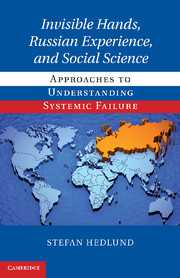 Invisible Hands, Russian Experience, and Social Science
Invisible Hands, Russian Experience, and Social Science Book contents
- Frontmatter
- Contents
- Preface
- Introduction
- 1 Opportunity and Self-Interest
- 2 Scope and Tradition of Social Science
- 3 Markets under Central Planning
- 4 Russia's Historical Legacy
- 5 Markets Everywhere
- 6 Institutional Choice
- 7 History Matters
- 8 Concluding Discussion
- 9 Implications for Social Science
- Bibliography
- Index
- References
5 - Markets Everywhere
Published online by Cambridge University Press: 01 June 2011
- Frontmatter
- Contents
- Preface
- Introduction
- 1 Opportunity and Self-Interest
- 2 Scope and Tradition of Social Science
- 3 Markets under Central Planning
- 4 Russia's Historical Legacy
- 5 Markets Everywhere
- 6 Institutional Choice
- 7 History Matters
- 8 Concluding Discussion
- 9 Implications for Social Science
- Bibliography
- Index
- References
Summary
Thus far we have argued that markets may be found everywhere, even under the most repressive forms of command economy. We have suggested that the implied dichotomy between plan and market, which made up the core of theories on alternative economic systems, was partly misleading, and we have indicated a need to provide nuance by focusing more closely on the informal institutional context of transactions. The subsequent two chapters will be devoted to a combined investigation first of how informal norms may impede ambitions to promote a high-performance economy, and then of how such norms may be reproduced over centuries, even when the effects are seriously detrimental to economic efficiency.
In this chapter we shall set the stage for that investigation, by taking a closer look at the second part of the juxtaposition of plan versus market. To the previous argument on misunderstandings of what central economic planning was really about we shall add a number of qualifications regarding the textbook ideal of an instrumentally rational forward-looking market economy that is free of historical and cultural context.
Ever since the days of Adam Smith, the liberal economic tradition has rested on his portrayal of a natural “propensity to truck, barter and exchange one thing for another.” The presence of a strong urge to trade with others has been taken as evidence that individuals are always on the prowl for ways to improve their situation, and proponents of free trade have remained convinced that the associated expansion of markets will secure efficiency and economies of scale, thus making everybody better off.
- Type
- Chapter
- Information
- Invisible Hands, Russian Experience, and Social ScienceApproaches to Understanding Systemic Failure, pp. 139 - 166Publisher: Cambridge University PressPrint publication year: 2011


